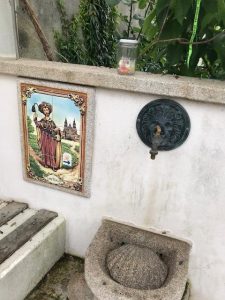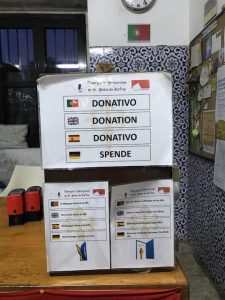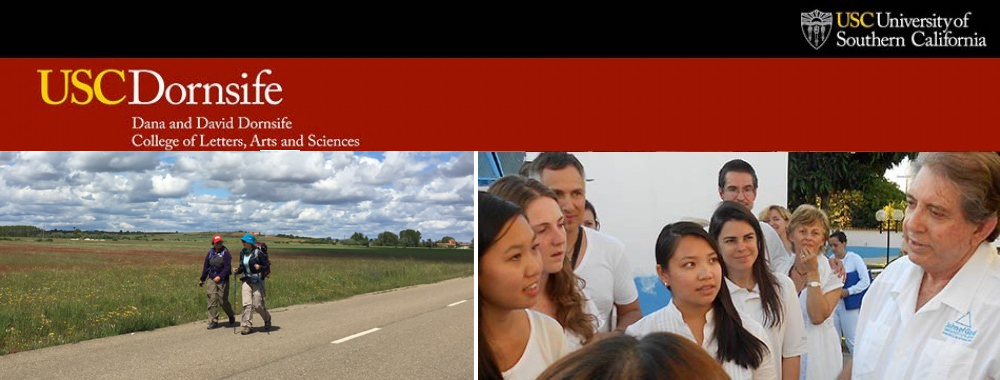
No need to buy water, water fountains are available alone the Camino of St. James
I took shelter under an awning, four miles outside of O Porriño. The rain was soaking through my tattered poncho as I sat eating from a jar of peanut butter with my finger. I’d skipped breakfast that morning in an attempt to beat the storm, but as the clouds gathered and the drops began to fall I saw the vanity of my efforts, deciding to stop for an ad hoc snack. An elderly Spanish couple tottered down the staircase next to me, and as they passed by the woman joked that I looked like I could use something other than my finger with which to eat my peanut butter. “Necesitas un cuchillo o algo. (You need a knife or something.) No debes usar sus dedos. (You shouldn’t use your fingers.) No eres salvaje. (You’re not a savage.)” I returned to my snack with a chuckle, and probably wouldn’t have remembered the interaction at all had that same woman not two minutes later tapped me on the shoulder and offered me a spoon with which to eat, as well as a paper towel and several cookies that she had gathered from her home just up the street. Rusty with my Spanish, my gratitude was transmitted through my eyes. “No pase nada (Don’t worry about it),” she said. She then planted a quick kiss on my cheek and took off down the road, arm-in-arm with her husband.
These moments — these selfless acts of giving — are fundamental to the construction of the unique feeling of comradery and belonging that one feels as a pilgrim on the Camino, a brand of Victor Turner’s communitas that thrives on the tortuous trails to Santiago. Charity abounds: be it the woman who nightly opens her home to strangers, providing food, song, and dance at no cost to them; or, the family who facilitates a self-serve lemonade stand on their driveway for pilgrims; or, market goers and shop owners who give those walking the Camino better places in line; or, the unknown benefactor who leaves candy at one of the many complementary pilgrim water stations. The culture of giving on the Camino is integral to the atmosphere of unity, equality, and compassion that so defines the Camino experience, an atmosphere that Turner and others have come to call “communitas.”
The charity a pilgrim experiences along The Way often comes from external sources, like those benevolent community members mentioned above who live or work along the Camino route. But just as common is the tendency of pilgrims to give to others who walk alongside them. It’s typical for pilgrims to share not just polite conversation, but also food, medical supplies, and invaluable advice about how to best tackle the miles to come. As Hannah, a 20-something year old woman from London recalls, “I’m a walking charity case. I came here far less prepared than I thought I was. My camouflage bucket hat you see here, my hiking poles, my earbuds — all given to me by kind strangers I met along The Way.”

Donativo, means donation based. Food, drink, lodging, and other goods may be offered to pilgrims and only a donation asked in return.
Not all gifts a pilgrim may receive while on the Camino are quite as tangible as the hiking gear that Hannah received. Sometimes, the biggest gifts may come after a pilgrim has left the trails behind. Molly and her friend Dan, for example met while walking the French route together five ago, in 2013, and have kept in contact ever since. They made a pact to walk the Portuguese route together in 2018. Their plans were complicated when Dan was diagnosed with ALS a year before he was set to walk again with Molly. Too weak to walk himself, Molly now has dedicated her second Camino to him. “I walk now with two passports: one for me, and one for my friend. I plan to give his to him after I finish the Portuguese route. I hope seeing all the stamps (given by hostels and restaurants) from this journey will give him strength in his fight against the illness.”
So many walk the Camino for themselves, expecting the journey to bring them closer to God, offer them insight into a dilemma, or just to provide a photo-worthy adventure. It’s imperative we remember that each of these opportunities for self-improvement on the Camino, while important and valid, is only possible because of the charity of someone else. On the Camino de Santiago there is a tendency to give selflessly to those around you.

A home along the Camino set up a free water disperser and provided lemons to freshen the water.
